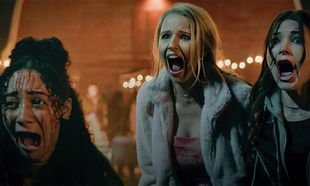Moving to London to study fashion design, Eloise Turner (Thomasin Mackenzie) retreats into her own world and soon begins to imagine herself in '60s London as a singer (Anya Taylor-Joy). While the glamour and thrills of the time period prove inspirational to her work, the fantasy soon becomes a nightmare as the sinister realities of that time come to the surface...
For a movie that speaks about how nostalgia is an ultimately hollow pursuit, 'Last Night in Soho' feels like it's guilty of not heeding its own message. From the opening minutes, Edgar Wright's direction and Krysty Wilson-Cairns' script are very clearly drawing lines and parallels with the likes of psychological horrors like 'Don't Look Now', 'The Girl Who Knew Too Much', 'Eyes of Laura Mars', 'Repulsion', and many more murder-mystery horrors and thrillers. The problem with 'Last Night in Soho' is that while it's able to hold the same rhythm as these, it's ultimately a cover band version that can't capture the intensity or the impact of the original recording.
Still, there's a lot to enjoy about 'Last Night in Soho'. Thomasin Mackenzie continues to chart her path to stardom, and here gives a full-throttle performance that is mesmerising and terrifying in equal measure. We see the horrors through her eyes and we believe them, which is no easy thing to do. Anya Taylor-Joy, who plays the elegant '60s singer Sandie, has all of the charisma and presence you'd expect, while Matt Smith's London gangster feels more like a bad caricature than real performance. The supporting cast assembled, however, is where the real heart of the thing lies. Terence Stamp, Diana Rigg, our own Pauline McLynn, all of them are able and willing to go along with the craziness of it all and do so with grace and composure. Diana Rigg, in particular, is thrillingly hostile as the landlady Ms. Collins, while Terence Stamp's threatening aura is palpable in every scene.
Likewise, Wright's musical choices are perfect and you can tell that he has a real admiration for the time period and a real sense of what makes it all so alluring. The script does needle at some uncomfortable parts, be it in college cliques and the ostracisation people can feel, not to mention the general awkwardness of early adulthood.
The problem with 'Last Night in Soho' is that while it's able to deliver a cracking cast, a great soundtrack, and a terrific first hour, the whole thing begins to go steadily downhill by the second hour. While the twists and turns might feel cheap and chintzy, it's in keeping with the gawdy genre thrills that Wright and Wilson-Cairn's script is going for. Again, the problem with all this is that it's not particularly scary and it's not particularly clever either. Wright does know how to create atmosphere and tension, and he's more than willing to go to some truly dark places, but it never quite has an impact and all of it feels tempered by a certain amount of silliness. Compared with something like 'Malignant', which also borrowed heavily from giallo horrors and thrillers, 'Last Night in Soho' never lets itself get really over-the-top with things. Instead, it remains just a little bit too safe for a genre that's supposed to be daring and outrageous.
'Last Night in Soho', ultimately, is a well-crafted, well-meaning thriller. The problem is it's just not on the same level as the movies it aspires to be.







































































